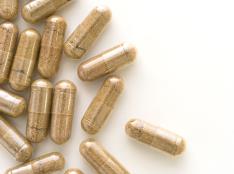Whether you’re going completely vegetarian, cutting back on meat or just looking for simple, cheaper sources of protein, here are a few filling foods that don’t require a trip to the butcher.
Cheese
2 of 11
Cheese is an excellent source of protein that enhances nearly any meal—incorporate a single slide of cheddar cheese to a meal, and you've added around 7 grams of protein.
Cheese also has a ton of variety and is even a great snack on its own (string cheese, anyone?). Experiment and try different cheeses from your favorite farmer's market and pair it with wine or sparkling water with a touch of lemon. Voila! You have a gourmet, protein-rich snack.
Find More:
Nutrition TipsQuinoa
3 of 11
Quinoa is a wonder food and a perfect base for many different flavors. Whether it's a Mexican-inspired dish with black beans and tomatoes or a substitute for grains in a Mediterranean salad, quinoa is a kitchen staple.
It is gluten-free, packs 8 grams of protein per each cooked cup and can be bought in bulk for last-minute, protein-packed meals.
Find More:
Nutrition TipsLentils & Beans
4 of 11
It only takes a half-cup of lentils to get in 9 grams of protein, plus a ton of fiber.
Beans are super versatile; make a pot of hot bean soup with peppers and spices, mash up some lentils for a filling side at dinner or check out bean chips at your local supermarket.
Find More:
Nutrition TipsAlmonds
5 of 11
Almonds also make an excellent, high-protein snack. You can snack on them by themselves or indulge in an almond butter spread. One serving of plain almonds packs 7 grams of protein.
Along with its protein density, almonds help build strong bones and teeth and nourish your nervous system.
Find More:
Nutrition TipsChickpeas
6 of 11
Chickpeas make a great base for meals, whether its hummus for dipping lunchtime veggies and pita or chickpea pasta for dinner. Roasted chickpeas are also a delicious way to get your protein in. Add them to salad for some extra crunch, mix them in with a spicy Thai dish or mash them up for a great sandwich spread that you can make ahead of time.
There are too many options not to love chickpeas as a meatless protein source—a cup of chickpeas has a whopping 39 grams of protein.
Find More:
Nutrition TipsOatmeal
7 of 11
Whether it's an instant oatmeal packet (though watch out for artificial flavorings and added sugar) or steel cut oats, oatmeal has been a staple at the breakfast table for a long time—mostly because of its fiber content and filling protein. Oatmeal can be dressed up with numerous toppings such as honey, raisins and berries. Just be sure not to microwave those steel cut oats; they require time in the slow cooker or on the stove.
A cup of oatmeal has around 6 grams of protein.
Find More:
Nutrition TipsHemp Seeds
8 of 11
If you want a seed that packs a big punch in the protein department, hemp seeds are the one. They go perfectly on top of salads, in smoothies or in morning granola.
Why add hemp seeds to your everyday dishes? Aside from their whopping 11 grams of protein per serving, hemp seeds reduce risk of heart attack, benefit skin disorders, aid digestion and have also been shown to help with anxiety.
Nervous about the hemp seed's cousin marijuana? No worries. Hemp seeds only contain trade amounts of THC and therefore do not have the psychoactive qualities of marijuana.
Find More:
Nutrition TipsSoy
9 of 11
Although some people have sensitivities to soy, it can be a wonderful protein source that helps reduce the risk of certain health issues when used as a replacement for animal protein.
Want to know how to get soy into your diet? Edamame, soy milk, tofu and soy burgers are all excellent sources of protein. Edamame alone boasts 22 grams of protein per cup! Tofu is a great base food, as it takes on whatever flavor you add to it. Go spicy with a Thai-inspired dish or blend it in your next smoothie for a protein punch.
Find More:
Nutrition TipsEggs
10 of 11
Eggs are a classic source of protein—and for good reason. Just one large egg carries about 6 grams of protein. Better yet, they're great for your heart and brain health.
Aside from being the main event at breakfast, eggs can be used as an unexpected addition to a burger or as a base for a yummy, savory frittata. Nothing is better than eggs fresh from the farm, but if that isn't an option, look for cage-free eggs at the store. Note that just because they're brown doesn't make them cage-free.
Find More:
Nutrition TipsYogurt
11 of 11
Yogurt is not only amazing for its protein content, but it has loads of good bacteria for your gut that aid digestion. It's fantastic on its own or as part of a refreshing smoothie or hearty dip.
To get the most protein for your dollar, lean toward Greek yogurt. Greek yogurt has a thicker consistency because it is strained from the whey found in regular yogurt. This also means that it has almost double the protein of regular yogurt, with a basic store-bought container containing around 17 grams of protein.







Discuss This Article